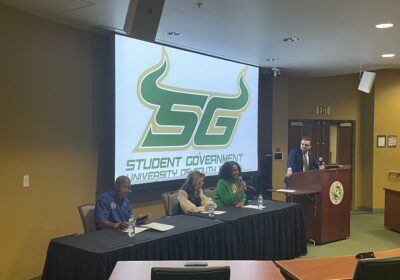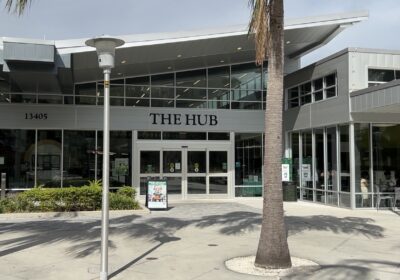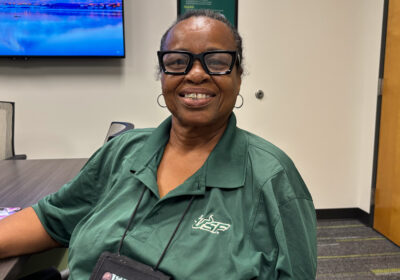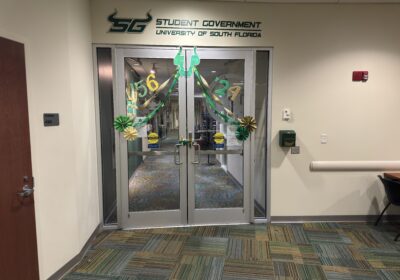Some students concerned, others confident about return to campus and safety measures
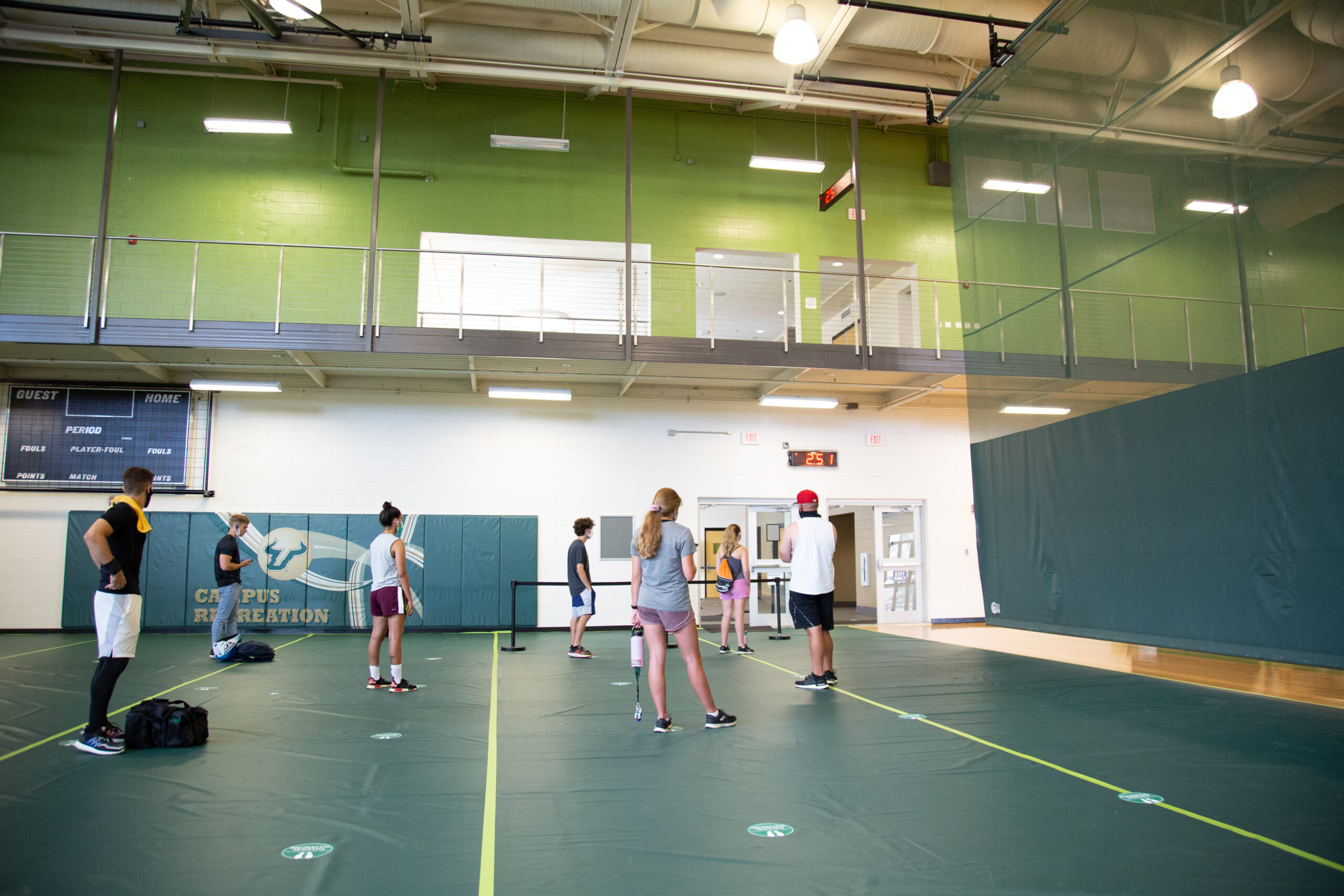
With the resumption of face-to-face classes, students are still wondering whether the university is prepared enough to contain the spread of the virus while welcoming thousands of people back on campus after universities across the country reported a spike in COVID-19 cases only a week into the semester.
After a handful of universities have gone remote weeks after bringing students back to campus, many students are uneasy about the fate of USF’s in-person classes, living and activities as COVID-19 shows no mercy with rapid infections among college students.
The University of Notre Dame recently shifted online after over 100 people tested positive for COVID-19 and said it will be virtual for a minimum of 14 days, according to The New York Times on Aug. 18.
Michigan State University decided to cancel the plans for students, faculty and staff to come back to campus two weeks before students planned on moving into their dorms, according to Inside Higher Ed.
In an article published on Aug. 20, Forbes detailed more universities that have had issues with COVID-19 since reopening some of their on-campus activities. The article said the entire student body of Northeast Mississippi Community College is under quarantine and has had 53 confirmed student cases overall. The University of North Carolina at Chapel Hill canceled its in-person classes just seven days after classes began.
Despite the odds, USF Spokesperson Adam Freeman said the university is prepared to take action and do whatever necessary as situations arise.
“USF continues to monitor public health data on a daily basis to make evidence-based decisions that prioritize health and safety when evaluating whether to remain in the current phase, proceed to the next phase or scale back to a previous phase,” Freeman said. “USF’s plan is intentionally designed to be flexible and can be adapted based on changing COVID-19 conditions.”
As for USF, all in-person classes that have been approved are set to happen, but some students are not hopeful regarding how long it will take these classes to go remote.
Nandini Agarwal, a senior majoring in finance and accounting, said she believes that all classes should be taught virtually this semester to prevent an increase in COVID-19 cases.
Since she is scheduled to graduate in December, she also said graduation should be held safely by following the Centers for Disease Control and Prevention (CDC) guidelines, but feels a ceremony will only be possible if the proper precautionary behaviors are taken throughout the semester.
“It’s not actually that imperative to open campus in the fall and I don’t see the rush to do so,” Agarwal said. “What’s more important is that we are able to stay healthy and be able to honor the individuals who have worked so hard for the past four years, and a lot of the current plans seem to put that in risk.”
Even though she said she feels classes should be remote, Agarwal recognizes virtual learning is difficult for many.
“I have to take high-level accounting and finance classes online which actually leads to bad grades because the learning is not the same,” she said. “You’re pretty much teaching yourself. In two of my classes we don’t even have lectures even when they are listed as hybrid.”
Despite feeling that she will not perform as well academically, Agarwal said it is necessary for the greater good.
“It’s a double-edged sword, however, good health takes precedence over quality education at this point,” Agarwal said. “In my opinion, classes should be online, but professors’ expectations of students should be lessened.”
Gunner, a senior majoring in civil engineering with a focus in environmental and water resources, who wishes to keep his last name anonymous, thinks that opening the university is the right decision overall, but said he recognized that not everyone will follow the guidelines.
“It is silly and wasteful to have signs on seats like benches,” he said. “It all just comes down to personal risk.”
His opinion, he said, comes from looking at the statistics.
“If it was like 20 percent of COVID-19 deaths were college aged I would have a different viewpoint on it, and I don’t think college aged [people] make up 1 percent of COVID-19 deaths,” Gunner said.
As of Aug. 19, people between the ages of 15 and 24 made up about 0.225 percent of COVID-19 deaths, according to the CDC.
A junior majoring in chemistry, who wishes to remain anonymous, is unable to return to campus due to health conditions.
“I am severely immunocompromised,” they said. “The prevention measures are not enough. A sign isn’t going to stop these people.”
After recently being in the hospital for a flareup with their medical conditions, they said coming back is just not worth the risk.
Disregarding the signage and restrictions on campus that have been put in place to keep students safe could result in not only removal from the area, but also being reported for disciplinary action, according to Althea Paul, USF’s media relations manager.
However, CJ Lopez, a senior majoring in economics, said people will not always follow the new rules.
“I don’t think the preventive measures they have in place are bad,” Lopez said. “I just think they’d be foolish to think that everyone will abide by them.”
Dean of Students Danielle McDonald released a statement saying it’s the duty of every student to keep other students accountable for their actions and to confront and report risky behaviors that could easily spread COVID-19.
For Gunner, the responsibility should be put on students to report their peers.
“I don’t think there is a problem with friends hanging out together, but they may be wary of it because they are afraid of punishment or being reported.”
Large gatherings are a part of the reason many universities have gone remote already.
According to The New York Times, two off-campus parties at the University of Notre Dame were connected to fostering an environment for COVID-19 to be transmitted, and multiple party-goers soon had positive tests after attending.
Some of the already-remote colleges have attributed rising cases on their campuses to Fraternity and Sorority Life events.
The University of North Carolina at Chapel Hill had a spike in the number of COVID-19 cases after reporting several clusters within the first week of classes, as well as the University of Washington’s Seattle Greek life, which has resulted in a minimum of 165 cases.
Gunner said he is not a proponent of overly crowded gatherings and does not think people should be throwing parties in close quarters, but said he hopes students won’t be reprimanded for spending time with friends.
“I don’t think hanging out with a group of people should be a reportable offense. … I hope the school wouldn’t try to punish those students or the organization they belong to,” he said.
Among much confusion, one student has found USF’s decisions to be positive for trying to keep students testing negative for COVID-19.
Ben Luttrell, a junior majoring in health sciences, said he thinks that those who need to be on campus should have the opportunity to do so.
“I find it to be encouraging that individuals who need a campus to come to, for whatever reason, have a place that is taking precautions and actively trying to prevent an outbreak instead of doing little and just expecting an outbreak,” he said.
Luttrell said that requiring students to test negative for COVID-19 before moving on campus, wearing face masks on campus and preventing large gatherings are all useful precautions.
He sees the best of both worlds and said students who are worried about contracting the virus should have a virtual option for all the courses they need to take, but also those who prefer a face-to-face style of teaching would benefit from some classes being in person.
With still much uncertainty as to what will happen the first few weeks of students, faculty and staff coming to campus, Freeman said USF is prepared to make the same decision it did in March if need be.
“Faculty have been advised numerous times that they must be prepared to transition all classes to quality online delivery at any point during the fall semester, if the university deems appropriate based on COVID-19 conditions,” Freeman said.

